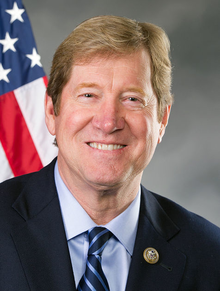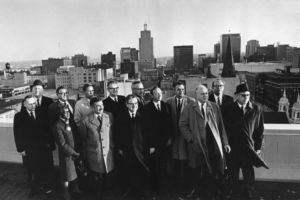The Star Tribune mischaracterizes Met Council compliance bill advancing in the U.S. House
Yesterday, Congressman Jason Lewis (MN-02) asked his colleagues in the House to solve a long-standing problem: our regional planning body in the metro (i.e. Met Council) does not comply with a sensible federal law requiring that local elected officials sit on the governing board of all metropolitan planning organizations (called “MPOs”).
In fact, the Met Council, designed in the 1960’s, is the only MPO in the entire United States that fails to comply with this sensible requirement.
This powerful regional body has been operating under a federal waiver for years.
Congressman Lewis’s colleagues unanimously agreed that the Lewis amendment was a good idea. The amendment was included in a larger transportation measure (H.R. 4) which is expected to pass as early as today. Then it moves to the U.S. Senate where Senators Klobuchar and Smith, if they block it, will have to defend the idea that regional planning is somehow better without the input of local elected officials. (More on that below.)
The Star Tribune’s Eric Roper responded with an otherwise informative article about the issue that unfortunately led with this sensational paragraph:
The Metropolitan Council would be stripped of its authority to distribute millions of federal transportation dollars if a provision approved by the U.S. House of Representatives on Thursday becomes law.
 Here is Congressman Lewis on the House floor yesterday addressing that concern:
Here is Congressman Lewis on the House floor yesterday addressing that concern:
My opponents are…saying this single handedly stops federal funding for any transportation funding in the area… but in the past when other MPOs have come into compliance it hasn’t had this affect. It simply hasn’t happened. Congressional intent is that any MPO whose structure changes in order to adhere to federal law, will be given a transition period. This amendment does not put in jeopardy any current or future federal investments or grants. In fact, my colleagues and I from Minnesota have been working with DOT to make certain our region gets the federal support we need.
Several bills are already moving through the Minnesota legislature that would bring the Met Council into compliance with federal law. Rep. Tony Albright and Sen. Eric Pratt have offered a bill that would bring the Met Council into compliance with federal law. Dayton is not expected to sign it but the Lewis amendment could change all that; and if he refuses, the next governor can get it done.
Again, here is Congressman Lewis:
Constituencies across the country deserve to have a voice in choosing who represents them and their needs on their local MPOs. The decisions made by these organizations directly affect the communities they govern. Our Met Council in Minnesota is the only MPO in the nation which does not have elected officials on their board, and yet they have independent authority to raise taxes. Having local elections increases the accountability of these regional boards. As federal law mandates, Met Council membership should include those elected by the people, for the people.
This powerful regional body has been operating under an exemption for years, and it has been the subject of controversy since it was conceived. Even its most ardent defenders admit that the legislature would never again approve either the governing structure or the broad scope of authority entrusted to the Met Council.
 Wake up, Minnesota. The metro area is the heart of the state’s economic engine and it deserves better than the old pacemaker we installed in the 1960’s. The Met Council is your great-grandfather’s planning body (see photo of original Met Council).
Wake up, Minnesota. The metro area is the heart of the state’s economic engine and it deserves better than the old pacemaker we installed in the 1960’s. The Met Council is your great-grandfather’s planning body (see photo of original Met Council).
Our metro population and job growth is much lower than our peer cities like Denver, and the state is losing so many people that we are expected to lose our eighth congressional district after the 2020 census. Not to mention our crippling traffic congestion.
We need 21st century, innovative regional transportation planning that maximizes federal, state and local dollars to reverse our regional decline. Consultation with locally elected officials is a great first step, and cannot come soon enough.